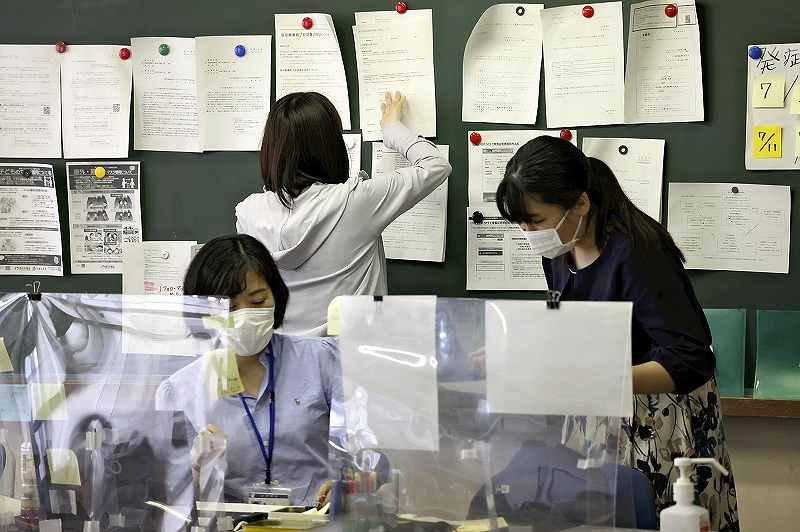Asymptomatic COVID-19 patients may be allowed to go out

Public health center officials busily work to cope with the seventh wave of novel coronavirus infections in Edogawa Ward, Tokyo, on July 14.
16:16 JST, August 27, 2022
The government is considering allowing asymptomatic COVID-19 patients to go out to buy food and other daily necessities on the condition that they take thorough measures to avoid spreading the infection, starting as early as mid-September, according to government sources.
Currently, the government imposes restrictions on all people infected with the novel coronavirus in regard to going outside their homes. If asymptomatic patients wear masks and thoroughly take other infection-prevention measures, the government plans to allow them go out to make their minimum necessary purchases.
The government is also considering relaxing reporting requirements for the number and other details of all people who test positive for the virus. It is taking the view that the range of infected people who should be reported to health authorities can be limited, in a uniform nationwide way, to those at high risk of developing serious symptoms.
Under the Infectious Diseases Law, people infected with the novel coronavirus are required not to go out regardless of whether they have symptoms.
The planned relaxation of the restrictions on going out is being considered because a large number of infected people recover by themselves at home as they are asymptomatic or have mild symptoms during the current seventh wave of infections.
The government pays consideration to the fact that many such people, mainly those who live alone, face inconveniences in their daily living.
As for reporting the number and details of all infected people, which currently includes confirming their names and other personal data, Prime Minister Fumio Kishida said on Wednesday that prefectural governments can limit the range of infected people to be reported to health authorities on their own judgment.
However, local officials criticized the policy, saying that the central government should set a standard.
Thus the central government decided to quickly introduce a uniform nationwide measure as its own responsibility.
The government aims to implement the relaxation of restrictions on going out and the review on compiling numbers and details of all infected people in mid-September.
After the required scope of reporting of infected people is limited, the government is eyeing the introduction of a new system in which only hospitals designated by local governments will need to report information about patients to health authorities.
10 prefectures begin reviews
Regarding the review of the current requirement to report all novel coronavirus cases, in which doctors will instead be required to report only on patients at high risk of developing serious symptoms, 10 of the nation’s 47 prefectures have been considering introducing their own new methods prior to the uniform nationwide change, a Yomiuri Shimbun survey found.
The survey on Friday of all prefectural governments found that Miyagi, Ibaraki and Saga prefectures had already decided to review the current method. Another seven prefectures, including Gunma, Tottori and Kagoshima, replied that they were positively considering the review.
As the main reason for the policies, the prefectural governments cited reducing burdens on public health centers and clinics offering care for people with fevers.
On the other hand, six prefectures, including Tokyo and Wakayama, replied that they would maintain the current method of compiling the numbers and details of all infected people.
The main reason they gave for the policies is that gaining information about patients with mild symptoms is necessary.
The remaining 31 prefectures replied that they were considering the issue and which direction to choose.
The results clearly indicated that many local governments have been worried about the lack of a uniform national policy from the central government, which instead left judgments to prefectural governments.





